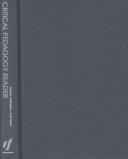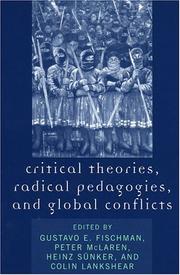| Listing 1 - 10 of 699 | << page >> |
Sort by
|
Periodical
Year: 2008 Publisher: Montreal : Greensboro, NC : Paulo and Nita Freire International Project for Critical Pedagogy University of North Carolina Greensboro
Abstract | Keywords | Export | Availability | Bookmark
 Loading...
Loading...Choose an application
- Reference Manager
- EndNote
- RefWorks (Direct export to RefWorks)
Book
ISBN: 1803566663 Year: 2023 Publisher: London : IntechOpen,
Abstract | Keywords | Export | Availability | Bookmark
 Loading...
Loading...Choose an application
- Reference Manager
- EndNote
- RefWorks (Direct export to RefWorks)
The chapters in this book explore the methods by which the many aspects of creative pedagogy might be implemented in the context of teaching and learning. One chapter proposes a creative approach to studying local history, while another suggests a pedagogical framework for coding education that has the potential to foster the development of creative thinking abilities and equip individuals to actively participate in global affairs. The utilization of case studies in the field of Citizen Science demonstrates the implementation of a comprehensive and innovative learning framework that incorporates several sensory modalities. Another chapter demonstrates the potential of maker spaces in fostering active and creative learning as well as enhancing student engagement among underrepresented and minority populations. One chapter explores the emergence of flow in STEAM activities as a means to promote heightened levels of comprehension and active engagement in science education. The book concludes with the presentation of two scholarly studies on the implementation of creative pedagogy within the context of Higher Education. The first study explores the advantages of collaborative creativity within the bachelor of social work programs. The second delves into the pursuit of an innovative design that effectively connects the curriculum with the work environment, resulting in the integration of valuable educational content inside professional settings.
Periodical
Year: 2008 Publisher: Montreal : Greensboro, NC : Paulo and Nita Freire International Project for Critical Pedagogy University of North Carolina Greensboro
Abstract | Keywords | Export | Availability | Bookmark
 Loading...
Loading...Choose an application
- Reference Manager
- EndNote
- RefWorks (Direct export to RefWorks)
Book
ISBN: 9585138468 Year: 2020 Publisher: Buenos Aires : CLACSO,
Abstract | Keywords | Export | Availability | Bookmark
 Loading...
Loading...Choose an application
- Reference Manager
- EndNote
- RefWorks (Direct export to RefWorks)
We believe that the political-pedagogical and theoretical-conceptual construction that is synthesized in the notion of "critical emancipatory praxis" is tremendously productive for emancipatory education and Latin American critical pedagogies, because it opposes technical, neoliberal and hegemonic conceptions of the educational field and pedagogical; because it recovers the transforming activity of the human being, vindicating the articulation between the understanding and the transformation of reality; because it vindicates the importance of the construction of alternatives for the prefiguration of the society of the future, and therefore, it feeds utopia and hope; because it demands to be affected by the pain and suffering of the other or the other, to be indignant and activate the political exercise of resistance; because it demands the development of political action from below, hand in hand with oppressed peoples, communities and subjects , exploited and excluded.

ISBN: 0415922607 0415922615 Year: 2003 Publisher: New York : RoutledgeFalmer,
Abstract | Keywords | Export | Availability | Bookmark
 Loading...
Loading...Choose an application
- Reference Manager
- EndNote
- RefWorks (Direct export to RefWorks)

ISBN: 0742530728 9780742530720 Year: 2005 Publisher: Totowa Rowman & Littlefield
Abstract | Keywords | Export | Availability | Bookmark
 Loading...
Loading...Choose an application
- Reference Manager
- EndNote
- RefWorks (Direct export to RefWorks)
Book
ISBN: 1351562541 1315092581 Year: 2017 Publisher: London : Taylor and Francis,
Abstract | Keywords | Export | Availability | Bookmark
 Loading...
Loading...Choose an application
- Reference Manager
- EndNote
- RefWorks (Direct export to RefWorks)
"Carefully curated to highlight research from more than twenty countries, the International Critical Pedagogy Reader introduces the ways the educational phenomenon that is critical pedagogy are being reinvented and reframed around the world. A collection of essays from both historical and contemporary thinkers coupled with original essays, introduce this school of thought and approach it from a wide variety of cultural, social, and political perspectives. Academics from South America, Europe, Africa, the Middle East, Asia, and North America describe critical pedagogy's political, ideological, and intellectual foundations, tracing its international evolution and unveiling how key scholars address similar educational challenges in diverse national contexts. Each section links theory to critical classroom practices and includes a list of sources for further reading to expand upon the selections offered in this volume. A robust collection, this reader is a crucial text for teaching and understanding critical pedagogy on a truly international level. Winner of the 2016 Alpha Sigma Nu Book Award"--Provided by publisher.
Book
ISBN: 1975502892 9781975502898 9781975502904 1975502906 9781975502874 Year: 2021 Publisher: Gorham, Maine
Abstract | Keywords | Export | Availability | Bookmark
 Loading...
Loading...Choose an application
- Reference Manager
- EndNote
- RefWorks (Direct export to RefWorks)
Critical Transformative Educational Leadership and Policy Studies - A Readeris a comprehensive collection of critical contributions from most of the leading voices in the fields of educational leadership and educational policy studies, pushing back against the current neoliberal authoritarian environment. The volume offers alternative ways to perceive and to formulate education leadership and policy from a critical transformative perspective. Individual chapters discuss such topics as social justice in education; poverty, race and public education; counter-hegemonic education movements; the privatization of schools; and school reform and advocacy leadership, among others, all from a critical perspective. It is a crucial and timely volume for educators, school administrators, educational leaders, social activists, and union leaders concerned with the current state of our universities and our education system.
Book
ISBN: 9087905750 Year: 2008 Publisher: Rotterdam, The Netherlands ; Taipei : Sense Publishers,
Abstract | Keywords | Export | Availability | Bookmark
 Loading...
Loading...Choose an application
- Reference Manager
- EndNote
- RefWorks (Direct export to RefWorks)
Critical Literacies in Action: Social Perspectives and Teaching Practices asks how educators can become more experienced in order to truly support literacy, particularly for children of poverty or for those who have been labeled “at-risk”. This is especially important in current times, since a literate individual is one who is more successfully able to situate him- or herself within a continuum of lifelong learning in order to fulfill personal goals and to participate fully within the wider societyal context. Although the word “literacy” has been with us for a very long time, the very meaning of the term itself has become increasingly complex due to a multiplicity of factors. At least in part, this complexity is a function of expanding and interconnecting notions of what it is that constitutes modern literacy as well as the increasingly technological nature of the world within which individuals live and learn. As such, a new horizon in literacy research has appeared, promising to renegotiate traditional definitions of the term “literate” and what it means to be critically literate in this increasingly complex world. Definitions of literacy have also evolved along with the evolution of the computer. Currently, the term “literacy” describes a commitment to and participation in a multiplicity of meaning making systems, many of which exhibit ever-greater degrees of interdependence with one another. The term “Critical Literacy” has come into use relatively recently and is generally regarded as a sub-category of Critical Pedagogy—“Critical” because it promotes an agenda for positive social change.
Book
ISBN: 9087908016 Year: 2009 Publisher: Rotterdam, The Netherlands ; Boston ; Taipei : Sense Publishers,
Abstract | Keywords | Export | Availability | Bookmark
 Loading...
Loading...Choose an application
- Reference Manager
- EndNote
- RefWorks (Direct export to RefWorks)
“I trust no one more than Gerassi to make me understand America,” Jean-Paul Sartre Unrepentant Critical Pedagogy encompasses the life, times, and activism of John ‘Tito’ Gerassi. A lifelong political animal and radical educator, Tito has lived his critical pedagogy on the barricades and front lines of the Movement; as a newsman for Time, Newsweek, and The New York Times; as a blacklisted professor exiled in Europe; as a Korean War Green Beret; as best selling author of The Great Fear in Latin America and nine other books. Major historical figures in Tito’s life include Herbert Marcuse and Michel Foucault, Che Guevara and the Black Panthers, Simone deBeauvoir and Jean-Paul Sartre, and his own father, the artist and Spanish Civil War Republican General Fernando Gerassi. Unrepentant Critical Pedagogy gathers together a collection of previously unpublished and out of print essays and articles by Tito. There are also three new interviews with John Gerassi by Tony Monchinski examining Tito’s life, his time in the Movement, and his critical pedagogy.
| Listing 1 - 10 of 699 | << page >> |
Sort by
|

 Search
Search Feedback
Feedback About UniCat
About UniCat  Help
Help News
News